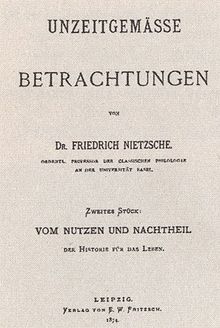Out of time considerations
The Untimely Considerations consist of four treatises by Friedrich Nietzsche that appeared between 1873 and 1876: First piece: David Strauss, the Confessor and the Writer , 1873; Second piece: On the benefits and disadvantages of history for life , 1874; Third piece: Schopenhauer as an educator , 1874; Fourth piece: Richard Wagner in Bayreuth , 1876. Nietzsche initially intended to devote the entire 30s of his life to the untimely reflections . Up to 13 working titles appear in his plans with topics such as “State”, “Religion”, “Science”, “Work and Property” and “We Philologists”. Only four of the considerations were implemented.
Content of the four untimely considerations
First piece: David Strauss, the confessor and the writer
The writing is a polemic against the "educational philistine" David Friedrich Strauss , whom Nietzsche tries to mock with crude words. Nietzsche rejects Strauss's secularized piety, which turned against Schopenhauer, and assumes that he has a parasitic relationship to the German classics. Strauss uses a corrupt German language, and so Nietzsche also criticizes language in the style of Schopenhauer.
The occasional work that appeared in 1873 was a social scandal, not least because of the use of the battle term "educational philistine" for the then celebrated writer David Strauss.
Second piece: The benefits and disadvantages of history for life
The second piece is a criticism of the historical science of its time, or better of the wrong relationship that has been established and passed on to it. Nietzsche is entirely of the opinion that something salutary could emerge from the historical perspective, if the relationship were correct, but he attests to his time a colossal overestimation of everything historical and historical education in general. Nietzsche is therefore not only of the opinion that history is completely misunderstood, but also that it is by far overrated.
The text, which was published in 1874, had a long history of impact, at least during the time it was first published. He was probably the most powerful of the four Untimely Considerations .
Third piece: Schopenhauer as an educator
This third out-of-time consideration pays homage to Nietzsche's philosophical teacher Arthur Schopenhauer , in whom Nietzsche recognizes and recognizes an educator. Nietzsche calls those great people and geniuses an educator who help to free people from external and external trivialities and identities and to find themselves. What Nietzsche particularly values about Schopenhauer is his truthfulness - even in suffering - and his love for truth. Nietzsche finds himself in the mirror of this love of truth.
The text appeared in 1874.
Fourth piece: Richard Wagner in Bayreuth
Wagner's plans for the Bayreuth Festival seemed to fail in 1874, and the first version by Richard Wagner in Bayreuth addresses reasons for Wagner's possible failure. It is surprisingly critical findings about Wagner's moral and artistic qualities in which Nietzsche initially sees the reason for Wagner's threatened failure. When the text was finished in 1875, Nietzsche rejected it. In the meantime the Bayreuth Festival was scheduled for 1876 and Nietzsche took up the plan for the untimely consideration again, but now as an appreciation of Wagner's lifetime achievement at the moment of greatest success. And yet the text reveals sobering insights into Wagner's nature: there is talk of Wagner's amateurism, but also of his inability to act. Much of the text is a nifty collage of Wagner quotes that try to evoke Wagner's old revolutionary spirit.
In terms of the history of its impact, the text that appeared in 1876 lagged behind the two later Wagner reviews Der Fall Wagner and Nietzsche contra Wagner .
expenditure
See Nietzsche edition for general information.
- The complete text is provided by the Critical Study Edition (KSA) in Volume 1. Volume KSA 1 is also published as a single volume under ISBN 3-423-30151-1 . The associated apparatus can be found in the commentary volume (KSA 14), pp. 64–74.
- There are ( text-critically inferior to the KSA ) editions of all untimely considerations
- published by Goldmann Verlag with comments by Peter Pütz , ISBN 3-442-07638-2 ,
- published by Insel Verlag with an afterword by Ralph-Rainer Wuthenow , ISBN 3-458-32209-4 .

